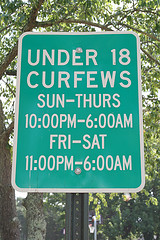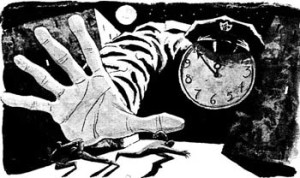No parent wants to see their kid coming home at 4 in the morning. Every parent relates the time their child comes home at with whether they were correlated in an event that could have a negative occurrence. Teenage years revolve around finding one’s self, outlook on the future, and at times, participating in events cause they are considered cool. Also, a form of acting rebellious. I was in high school, and without seeing statistics to backup my arguments I have first-hand experience that curfews lead teens to stay out of trouble. When I refer to curfews I am referring to state laws, not their parents giving the teenager a certain time to come home because those times vary among different adults.
A study shows that state’s that have curfews have lower crime rate among teens. For example, “Typical curfews require that teenagers under 17 years stay out of streets starting from 11pm or midnight. This is believed to protect them from crimes committed after nightfall, as well as from violating the law, and there exist serious evidence in favor of this conviction. For example, when New Orleans enabled a dusk-till-dawn curfew in 1994, the rates of juvenile crime were reported to fall more than 20 percent.” To go along with that statistic it also shows, “Even more impressive results were recorded in Dallas, which reported a 30 percent decrease in violent juvenile crime, and a 21 percent decrease in the overall rates of crimes committed by young people.” Crime rate among teens is proven to go down when curfews are enforced among teenagers.
Teenage curfews have been a widely debated topic throughout history. Parents curfews have been enforced to the distraught sense on a teenage. While curfews enforced by the government have become a larger issue due to the fact that some parents do not believe their child should have a curfew. That is a factor in the problem with society, but that is an argument for another day. I believe curfew laws need to be involved because of the safety of the children. The child involved may not drink or engage in any events that usually lead to trouble, but coming home around midnight compared to 2AM is much safer. A study shows that drunk driving accidents are 4.5 times greater to occur later at night than during the day. Why put your child in risk to become a victim of a drunk driving accident? The child might have implications in doing anything wrong, but can still be effected.
I also believe a curfew develops values within a teen. It instills responsibility and awareness amongst teenagers. If a teenage values the curfew law that means he understands the importance of it and its effect on society. The curfew law is enforced to keep teenager’s parents out of court arguing and saving money from the wrongdoing of their child. Studies show that 93% of cities that currently enforce a curfew law believe it is effective. The law also helps out cops because they are less apt to worry about children participating in troublesome late night events in the case that their parents are not strict and do not abide by their own curfew laws. Curfews are heavily effective within cities and states that value them. The law is a progressive sign in society that keeps teenagers out of trouble and is for the betterment of their life.
Works-Cited



Cool blog and interesting topic. As weird as this may sound, my town actually at one point made an 11pm curfew and encouraged high school kids to go back home and not stay out as late. Even though most of us didn’t follow the curfew very well, I believe that the idea is very smart. My mom has always told me that nothing good happens after 12 midnight and in some cases she is definitely correct. I believe that when my town enacted the curfew they were doing it more for safety purposes. Although the curfew would ultimately keep kids safe and out of trouble, it would have to be more strongly implemented for it to have an impact and to be followed.
enforcing curfews is definitely helpful when keeping kids out of trouble. as a young adult many kids will always find themselves trouble especially at night. my father when i was younger always preached nothing good happens to kids past 12 o’clock, maybe i didn’t want to hear that at the time, but i couldn’t agree more. having a set curfew for all kids i believe is too far, but every parent should have a curfew for their own child. obviously some kids are more responsible than others and your parents should base your own curfew off their own childs maturity
I really like this post and I believe that curfews are also effective ways of making teens more responsible and teaching them discipline. Where I live, there is a curfew, but it isn’t heavily enforce. We also have a very high crime rate, so I think that the crime rate among teens would drop if police enforced the curfew more. In this article from the LA Times, it examines how in a study of 72 cities across the country, 53% saw a decrease in crime rates when a curfew was enforced.
I really like this post and I believe that curfews are also effective ways of making teens more responsible and teaching them discipline. Where I live, there is a curfew, but it isn’t heavily enforce. We also have a very high crime rate, so I think that the crime rate among teens would drop if police enforced the curfew more. In this article fro, the LA Times, it examines how in a study of 72 cities across the country, 53% saw a decrease in crime rates when a curfew was enforced.
When I was growing up my parents also made me maintain a very loose curfew. I was to be home by about 11:30 but if I sent a text I was running late it was okay. I think that having a curfew can be beneficial in two ways 1: it can reduce the amount of trouble kids are getting into and 2: it can help keep kids safe. I thought the study you included regarding the correlation between crime rates and curfews was very interesting. However, I was a little confused at what is meant by crime rate. If the crime rate of small crimes such as vandalism went down then I would believe the correlation would be stronger, however, if more serious crimes reduced, I would have to target that at something the law enforcement had done.
The study you mentioned showing a correlation between teen curfews and crime rates was really interesting, and that’s definitely a convincing study. I’ve lived on military installations for a good chunk of my life, and (more often than not) everyone within those boundaries had to be inside by curfew. It may seem strange, but it made sense to me and felt very normal, and I think a similar study could prove the lower crime rate that resulted.
I believe that having a curfew is more for ensuring the safety. Growing up I learned that 90% of bad things happen at night. Also, with a curfew parents do not have to stay up, waiting for their child to return during an inhumane hour of the night. Plus, the curfew creates almost a blanket over the whole neighborhood it affects. For example, if the town curfew is at 11 o’clock, it would be easy to assume that most of the people still outside after 11 are up to no good. This is just my opinion though. However, i do not think there is a clear right or wrong answer to this question.